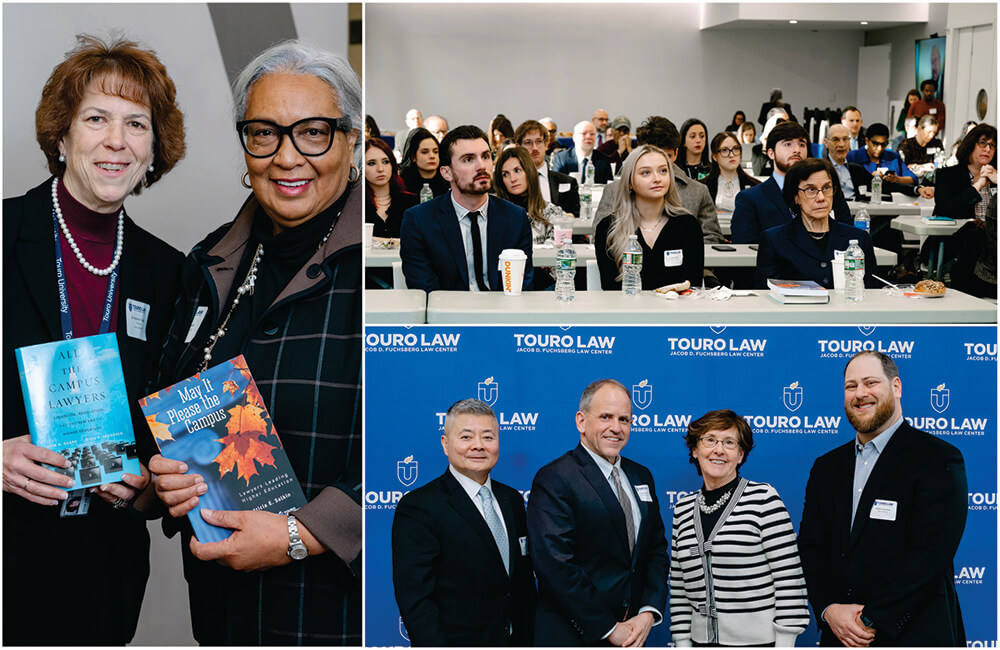Touro Law Center Hosts Groundbreaking Symposium on Leadership in Higher Education
Scholars, Policymakers and Industry Experts Reflect on Regulatory Challenges, Changes to College Leadership

Touro University and the Touro Law Center recently hosted a thought-provoking symposium at their Times Square campus, exploring the evolving leadership dynamics in higher education, and offering a platform to discuss the rising influence of legal professionals in academic institutions, fostering critical conversations on compliance, governance and innovation.
Titled “Academics, Lawyers, and Government: Who is Leading Higher Education in the 21st Century?”, the two-day symposium brought together legal scholars, policymakers and educational leaders. In his opening remarks, Dr. Alan Kadish, president of Touro University, highlighted the critical role of navigating the “highly regulated industry” of higher education.
“It is no secret that as political changes occur in Washington or in different states, regulations evolve, often impacting institutions in significant ways,” he said, and emphasized the importance of adapting to these changes and ensuring compliance while maintaining academic excellence.
An Industry in Flux
The symposium was inspired by two significant publications: May It Please the Campus: Lawyers Leading Higher Education, authored by Dr. Patricia Salkin, Touro’s senior vice president of academic affairs and provost of Touro’s Graduate and Professional Divisions, and All the Campus Lawyers: Litigation, Regulation, and the New Era of Higher Education, co-authored by Louis Guard, vice president and general counsel at Hobart and William Smith Colleges, and Joyce Jacobson, a former president of Hobart and William Smith Colleges. These works provided the foundation for discussions on the increasing reliance on legal professionals in university leadership roles, and the regulatory complexities faced by modern institutions.
“Since the 1970s, we’ve witnessed an exponential increase in government regulation and public policy influence on higher education,” according to Salkin. “Compliance costs alone can place tremendous strain on budgets, making innovation both essential and challenging. This shift has led to more lawyers assuming leadership roles, as institutions require greater legal acumen to navigate complex compliance requirements.”
The event featured four panels that addressed topics such as the shifting regulatory landscape, free speech challenges, a recent surge in institutional mergers, and the increasing number of lawyer-presidents leading colleges and universities. The panel discussions encouraged attendees to think critically about the evolving nature of university governance and the role of legal expertise in addressing pressing challenges, including the accreditation processes, the unrest on college campuses since the Oct. 7 attacks on Israel by Hamas, and Title IX compliance, which involves protecting students from discrimination. In her welcoming remarks, Touro Law Review editor-in-chief, Alexa Sondey, said that as higher education continues to face evolving regulatory demands, it’s increasingly important to examine these challenges through a legal lens, and that the expertise of the panelists reflected that need.
“This symposium brings together distinguished scholars, policymakers and industry experts to engage in scholarly discussions on why these changes are occurring and what the future may hold,” Sondey said.
Looking Ahead
The symposium concluded with a forward-looking perspective on how institutions can balance regulatory compliance with academic freedom and innovation, leaving the participants with valuable insights and a deeper understanding of the complex interplay between law, policy and educational leadership.
The success of this symposium underscored Touro University’s commitment to fostering meaningful dialogue on pressing issues in higher education, and it has set the stage for continued exploration and collaboration in navigating the legal and regulatory challenges that lie ahead. Plans are already underway for follow-up initiatives, including webinars, research publications, and future symposiums to further delve into the issues discussed and identify actionable strategies for higher education institutions, according to Salkin.
“The panels were informative and provocative, the participants were engaged, and there were robust question-and-answer periods,” she said, and noted that articles from the conference will be published in a special symposium edition of the Touro Law Review.
Elena Langan, dean of the Touro Law Center, praised the collaborative efforts behind the symposium, acknowledging the contributions of Salkin and the Touro Law Review.
“Provost Salkin really spearheaded this symposium, and she has been instrumental in bringing this discussion to the forefront,” Langan said. “And the real heroes of everyone responsible for putting this together are our Law Review student, and I am proud of them for their dedication to putting together such an impactful event.”

